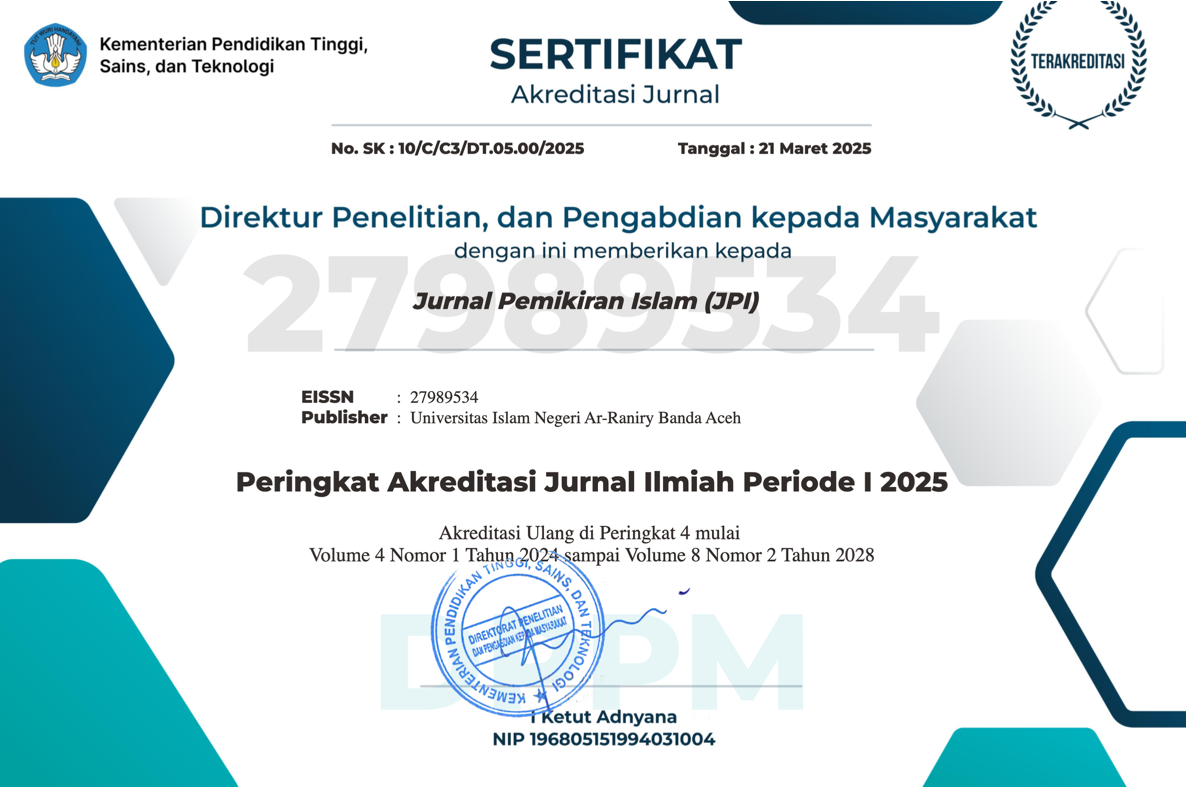Exploring the Dynamics of Understanding in Western Hermeneutics: From Reproducing Meaning to Rejecting Metanarratives
DOI:
https://doi.org/10.22373/jpi.v4i1.23251Keywords:
Western Hermeneutics, Reproduction, Production, Meaning, MetanarrativesAbstract
This study aims to provide an overview of the dynamics of emerging understanding regarding Western hermeneutics. Two main questions are addressed: (1) What is meant by hermeneutics? and (2) How has thinking about understanding evolved in Western hermeneutics? The research employs historical and verstehen methods. Two key findings emerge. First, hermeneutics represents an effort or approach to comprehend and interpret various objects of study, ranging from sacred texts, historical writings, scientific literature, culture, to human existence itself. Second, Western hermeneutics encompasses diverse perspectives on understanding. Modern hermeneutics, exemplified by figures like Schleiermacher and Dilthey, tends toward reproductive understanding, aligning with the author’s intent. In contrast, contemporary hermeneutics, associated with Heidegger, Gadamer, and Ricoeur, exhibits a productive tendency, generating new insights through reader engagement. Critical hermeneutics, as articulated by Habermas, views interpretation as a liberating endeavor. Deconstructionist hermeneutics, influenced by Derrida, leans toward radical understanding. Finally, postmodern hermeneutics, championed by thinkers such as Lyotard and Vattimo, rejects metanarratives in interpretation.
Downloads
References
Al Munir, M. I. (2021). Hermeneutika sebagai Metode dalam Kajian Kebudayaan. Titian: Jurnal Ilmu Humaniora, 5(1), 101–116. https://doi.org/10.22437/titian.v5i1.12508
Arias Schreiber, M., Chuenpagdee, R., & Jentoft, S. (2022). Blue Justice and the co-production of hermeneutical resources for small-scale fisheries. Marine Policy, 137(April 2021), 104959. https://doi.org/10.1016/j.marpol.2022.104959
Asmolov, A. G. (2016). Psychology of Modernity as a Social Situation of Development: Challenges of Uncertainty, Complexity and Diversity. Procedia - Social and Behavioral Sciences, 233(May), 27–34. https://doi.org/10.1016/j.sbspro.2016.10.122
Bertens, K. (2002). Filsafat Barat Kontemporer: Inggris-Jerman. Gramedia Pustaka Utama.
Britannica, T. E. of E. (2024). Hermeneutics. In Encyclopedia Britannica. https://www.britannica.com/topic/hermeneutics-principles-of-biblical-interpretation
Elbanna, A., & Newman, M. (2022). The bright side and the dark side of top management support in Digital Transformaion –A hermeneutical reading. Technological Forecasting and Social Change, 175, 121411. https://doi.org/10.1016/j.techfore.2021.121411
Fancourt, N., Foreman-Peck, L., & Oancea, A. (2022). Addressing ethical quandaries in practitioner research: A philosophical and exploratory study of responsible improvisation through hermeneutical conversation. Teaching and Teacher Education, 116, 103760. https://doi.org/10.1016/j.tate.2022.103760
George, T. (2021). Hermeneutics. In The Stanford Encyclopedia of Philosophy. https://plato.stanford.edu/archives/win2021/entries/hermeneutics/
Gjesdal, K. (2022). Hermeneutics. In Oxford Bibliographies. https://www.oxfordbibliographies.com/display/document/obo-9780195396577/obo-9780195396577-0054.xml
Hansen, A. V. (2019). Value co-creation in service marketing: A critical (re)view. International Journal of Innovation Studies, 3(4), 73–83. https://doi.org/10.1016/j.ijis.2019.12.001
Hardiman, F. B. (2015). Seni Memahami: Hermeneutika Dari Schleiermacher Sampai Derrida. Kanisius.
Hovey, R. B., Rodríguez, C., & Jordan, S. (2020). Beyond Lecturing: An Introduction to Gadamer’s Dialogical Hermeneutics With Insights Into Health Professions Education. Health Professions Education, 6(4), 465–471. https://doi.org/10.1016/j.hpe.2020.08.004
Hurley, G., Curtis, K., & Hammond, J. A. (2022). Hermeneutic phenomenological research on how nurse educators make meaning of compassion and understand its role in their professional practice. Nurse Education Today, 119(October), 105588. https://doi.org/10.1016/j.nedt.2022.105588
James, S., Cronin, J., & Patterson, A. (2024). “If you like your history horrible”: The obscene supplementarity of thanatourism. Annals of Tourism Research, 106, 103749. https://doi.org/10.1016/j.annals.2024.103749
Kaelan. (2005). Metode Penelitian Kualitatif Bidang Filsafat. Paradigma.
Lafont, C. (2016). Martin Heidegger. In The Blackwell Companion to Hermeneutics (First). John Wiley & Sons, Inc.
Martono, M. (2019). KAJIAN KRITIS HERMENEUTIKA FRIEDERICH SCHEIERMACHER Vs PAUL RICOEUR. Jurnal Edukasi Khatulistiwa : Pembelajaran Bahasa Dan Sastra Indonesia, 2(1), 42. https://doi.org/10.26418/ekha.v1i1.31713
Morán-Reyes, A. A. (2022). Towards an ethical framework about Big Data era: metaethical, normative ethical and hermeneutical approaches. Heliyon, 8(2). https://doi.org/10.1016/j.heliyon.2022.e08926
Mrugalski, M. (2021). Teoria/Literatura as a Mise en Abyme of Digital Research on Literary Studies. The Corpus of Polish Literary Theory Between Mathematical Intuitionism and Formalism. Russian Literature, 122–123, 85–111. https://doi.org/10.1016/j.ruslit.2021.07.005
Najib, M. M., Hamzawi, M. A., & Rohmawan, D. (2021). HERMENEUTIKA KLASIK DAN HERMENEUTIKA MODERN (Dari Merebutkan Objektifitas hingga Objektifitas Absurd). 7(2), 131–155.
Palmer, R. E. (2005). Hermeneutika: Teori Baru Mengenai Interpretasi. Pustaka Pelajar.
Rahman, D. R. (2016). Kritik Nalar Hermeneutika Paul Ricoeur. Kalimah, 14(1), 37. https://doi.org/10.21111/klm.v14i1.360
Sumaryono, E. (1999). Hermeneutika: Sebuah Metode Filsafat. Kanisius.
Wagemans, J. H. M. (2023). How to identify an argument type? On the hermeneutics of persuasive discourse. Journal of Pragmatics, 203, 117–129. https://doi.org/10.1016/j.pragma.2022.11.015
Watson, E. E., & Minns Lowe, C. J. (2023). Exploring the business skills, experiences and preparedness of UK-based private physiotherapists when establishing and developing a physiotherapy business: A hermeneutic phenomenological study. Musculoskeletal Science and Practice, 63(September 2022), 102694. https://doi.org/10.1016/j.msksp.2022.102694
Downloads
Published
Issue
Section
License
Authors who publish in Jurnal Pemikiran Islam agree to the following terms:
- Authors retain copyright and grant the journal right of first publication with the work simultaneously licensed Attribution-NonCommercial-ShareAlike 4.0 International (CC BY-NC-SA 4.0) that allows others to share the work with an acknowledgment of the work's authorship and initial publication in this journal.
- Authors are able to enter into separate, additional contractual arrangements for the non-exclusive distribution of the journal's published version of the work (e.g., post it to an institutional repository or publish it in a book), with an acknowledgment of its initial publication in this journal.
- Authors are permitted and encouraged to post their work online (e.g., in institutional repositories or on their website) prior to and during the submission process, as it can lead to productive exchanges, as well as earlier and greater citation of published work. (See The Effect of Open Acces)














